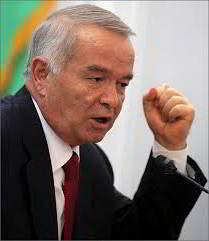 President Islam Karimov did not even bother to amend the constitution, which limits him to two terms. After yesterday’s sham election, he is preparing to begin his fourth term without batting an eye. Uzbekistan faces many uncertainties but one thing is sure—this 77-year-old “predator of press freedom” will continue censoring and ruling with an iron hand until he breathes his last.
President Islam Karimov did not even bother to amend the constitution, which limits him to two terms. After yesterday’s sham election, he is preparing to begin his fourth term without batting an eye. Uzbekistan faces many uncertainties but one thing is sure—this 77-year-old “predator of press freedom” will continue censoring and ruling with an iron hand until he breathes his last.
“The day will come when our citizens will enjoy complete freedom, all civil liberties and above all press freedom,” Karimov said at an election rally on 25 March. But the promised day is not about to arrive.
Uzbekistan’s leader since 1989, Karimov stops at nothing to enforce his implacable authority and reduce critics to silence. This includes arbitrary imprisonment, detention in psychiatric hospitals and widespread use of torture. Journalists pay a high price if they are tempted to take his professions of democratic faith literally. At least nine are currently detained. And they are not allowed to hope. Just as Mohammed Bekzhanov was about to complete a 13-year spell in jail in 2012, he was given an additional five-year sentence.
Karimov is everywhere in the media, boasting of his government’s “achievements” and warning the public against “destructive forces” that threaten “national values.” Anyone daring to underline the prevailing optimism by challenging the bullish official statistics or by seriously investigating social problems takes a big risk.
Independent journalist Solidzhon Abdurakhmanov was sentenced to ten years in prison in 2008 on a trumped-up charge of drug trafficking for covering the Aral Sea environmental disaster. Like most of the other detained journalists, he is in poor health and his condition is worsening.
Independent and opposition websites have long been inaccessible in Uzbekistan and the regime continues to plug the holes – creating a new entity for monitoring communications, bringing mobile phone operators to heel, blocking tools for circumventing online censorship and launching repeated cyber-attacks on outspoken sites.
Is this just cynicism or is it a worrying case of senility? The old dictator says he supports Internet freedom. But not all of his statements are so disconnected from reality. In an address to journalists in June 2012, he said, “choosing this profession (...) requires courage and self-sacrifice.” Nothing could be closer to the truth.